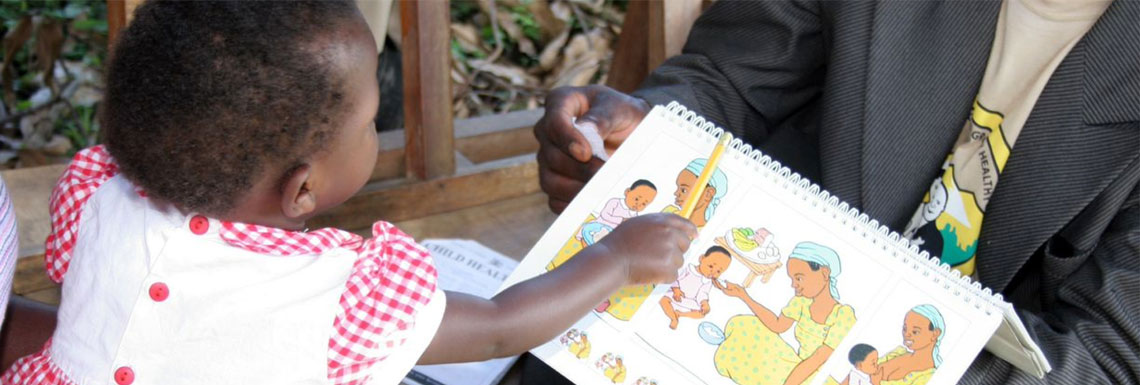
Since 1967, The Manoff Group has been working to bring about social and behavior change that enables people to live healthier lives. We leverage innovative research techniques to understand the types of improved practices people are willing to adopt, as well as the context in which those practices occur. This may include recognizing such things as family and gender dynamics, economics, policy and legal frameworks, commodity availability, community norms, anthropological factors, and perceived risks. With all of this in mind, we design and manage programs that lead to measureable and sustainable change. Our work is integrated into the full range of program activities. For example, programs focused on improving health care service delivery include a Social and Behavior Change Communication strategy to promote those services to target clients.
We respond to the real challenges of real people to lead healthy lives. And we don’t do it by ourselves. We work in true partnership with communities, leaders, donors and other stakeholders to make sure change comes from within and lasts well beyond our involvement.
We call our approach Behavior-centered Programming, an evidenced-based methodology that abandons the long-held belief that simply sharing messages with people about the health benefits of a new practice will persuade them to change their behavior. Behavior-centered Programming recognizes that behavior change programming must be developed and implemented in partnership with beneficiaries so that program strategies target their real motivators for adopting proposed practices, promote feasible changes, and use the communications channels that they prefer.
We’ve applied this approach to many seemingly intractable health and environment challenges in a wide range of technical areas. Behavior-centered Programming can be adapted to any issue requiring practical change.
Insight
Formative Research | Market Segmentation & Analysis | Anthropological Inquiry | Community Mapping
Behavior-centered Programming starts with a review of scientific recommendations on specific behaviors. For example, we know that correct and consistent use of condoms is highly effective in preventing HIV; and we know that sleeping under an insecticide-treated bed net significantly reduces the chances of malaria infection. For some practitioners of behavior change, this is where the insight stops. The Manoff Group, however, uses a suite of techniques that enables us to go further to ensure we gain the meaningful insights required to develop a strong program. Depending on the specific questions or knowledge gaps, we can apply standard quantitative and qualitative public health research methodologies to provide necessary answers, but we also have the expertise to draw from private sector market research and audience segmentation tools, anthropological approaches and participatory development philosophies. One of our key research techniques is called Trials of Improved Practices, or TIPs, which allows us to explore not only the current context for behaviors but also to create an opportunity for real-time testing of new behaviors in order to determine their feasibility within people’s real lives. Learn more about TIPs here.
Action
Strategy Development | Advocacy | Communications Materials (Radio, TV, Print, Mobile/Social Media) | Project Management | Social Marketing/Enabling Technology | Capacity Building & Supportive Supervision | Community Mobilization | Private Sector Engagement
Once we thoroughly understand the context, have firmly established our partnerships, and tested our thinking, we are ready to act. Starting with careful strategy development all the way through program planning, implementation and evaluation, The Manoff Group ensures our insights are leveraged to produce program results.
Our work in stimulating social and behavior change often includes developing communication products: creative and targeted mass media, materials to support one-on-one counseling, tools to help facilitate group meetings, and innovative in-home reminder materials. Our work also encourages community mobilization and social cohesion, tracks community and household data, engages local and/or national leadership, and improves service quality. We develop enabling technologies and, where feasible, we use social and mobile media and to support training, communication, and data sharing. Moreover, where commodity availability is an issue, we work closely with the private sector, service providers and distributors to ensure a robust social marketing, sales and distribution plan is in place to make sure necessary products are available.
We find that multi-channel approaches achieve the greatest results, particularly because the mix of mass media, group activities, and interpersonal communication complement each other. This mix of activities depends entirely on the project scope or mandate, the insight gathered during the first stage, what other key partners or stakeholders already have covered and, most importantly, what will actually work in the specific situation to facilitate behavior change.
Change
Community Monitoring Systems | Outcome Monitoring | Impact Evaluation
Our focus is on results—changing behaviors, improving health, and impacting lives. A groundbreaking example of this was our support to the Indonesian Government’s Nutrition Communication and Behavior Change Project from 1979 to 1982. Observing in particular that 40% of 2 year-old children in participant communities were better nourished than their peers in non-participant communities, a World Bank evaluation stated for the first time ever that, “… nutrition education alone can make a difference in improving nutritional status.” Project after project, The Manoff Group has continued to prove the impact of Behavior-centered Programming.
We feel change doesn’t end at the end of a project. To ensure replication of successes by other implementers, The Manoff Group makes Knowledge Management part a program’s standard communications and reporting activities. We help projects move from a results-only reporting model to a knowledge model that emphasizes the tools and methodologies that impacted success, and the issues to consider when replicating them.